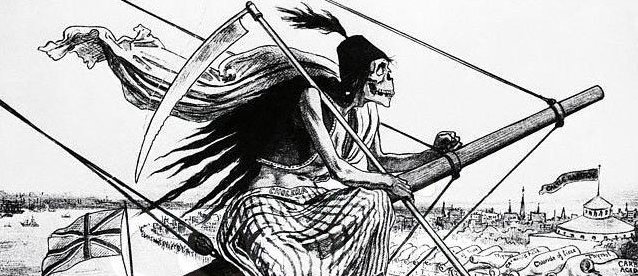Imagine the scene: the Chapel Minister has just been told it's costing £15,000 a year to cut the grass in the graveyard, soon after she’s been given a massive quote to fix the chapel’s roof. She rolls her eyes skywards and cries aloud: “Will no-one rid me of this troublesome graveyard?” If you are a … Continue reading A scandal in Sketty – Sgandal yn Sgeti
Dr Pulltuski and Waterloo teeth – the grisly origin of Victorian dentures
Before the twentieth century, tooth decay was common but very, very bad news. Amongst 27 London parishes in 1665, actuaries recorded ‘teeth’ as the cause of death in 115 cases in just one week. The consumption of carbohydrates, such as simple sugar is closely linked to tooth decay. From its position as a luxury good, … Continue reading Dr Pulltuski and Waterloo teeth – the grisly origin of Victorian dentures
Cambridge must keep the inconvenient grave of Tobias Rustat
The funerary monument of Tobias Rustat in Cambridge University has certainly created a lot of controversy. The Master and some of the staff at Jesus College claimed that, three centuries ago, Tobias Rustat had been a donor to the College but had also enriched himself as a 'slave trader'. Consequently his memorial on the wall … Continue reading Cambridge must keep the inconvenient grave of Tobias Rustat
The inconvenient grave of Tobias Rustat
The mortal remains of Tobias Rustat moulder in a vault under the floor of the Chapel of Jesus College in Cambridge University. The vault can’t be seen as it is under a floor mat. But on a nearby wall sits a massive stone memorial tablet, attributed to the studios of the magnificent sculptor Grinling Gibbons. … Continue reading The inconvenient grave of Tobias Rustat
The arrival of Killer Cholera in Britain
On the 23 October 1831 William Sproat, a sailor on the inshore coal boats at Sunderland, made a ‘short but disastrous contribution to British medical history’. On that day he fell ill with violent vomiting and diarrhoea, stomach cramps and his skin turned blueish grey. He died three days later, the first confirmed victim of … Continue reading The arrival of Killer Cholera in Britain
The unidentified victims of the Iolaire tragedy – remembered with their own memorials, unlike other unknown sailors
The special treatment of the bodies of the unidentified servicemen who drowned in HMY Iolaire 100 years ago is unusual - they were given headstones, whereas most seamen in WWI who washed up unidentified on British shores were buried in unmarked graves. Today marks the centenary of the Iolaire tragedy, when some 200 Scottish Hebridians … Continue reading The unidentified victims of the Iolaire tragedy – remembered with their own memorials, unlike other unknown sailors
Lassie, the resurrection dog
A chance discovery of a tombstone in West Norwood Cemetery led me to the torpdeoing of HMS Formidable and an amazing resurrection of a drowned sailor by a Hollywood legend. As the festive season descends upon us, it's nice to share a story with a positive twist. A while ago I found an overgrown headstone … Continue reading Lassie, the resurrection dog
Twentieth century body-snatching: battlefield grave robbers
I now look at several documented cases of body-snatching from the burial grounds of the Great War. I previously described the uncompromising approach of the authorities who managed the war graves of the dead of Britain and Dominions. Two decisions were particularly contentious: the uniformity of headstones, and the refusal to allow families to repatriate … Continue reading Twentieth century body-snatching: battlefield grave robbers
State-sanctioned body snatching in WWI? Who owns a dead body?
The Great War cemeteries are accepted today without question. But at the time, the British Empire’s policy of burying bodies overseas was controversial. It excluded the relatives from the process, leading to distress, protest and petitions. A few desperate families even resorted to body snatching to bring their soldiers' bodies back home. British soldiers’ had … Continue reading State-sanctioned body snatching in WWI? Who owns a dead body?
Palm oil, slavery and Liverpool’s abandoned Jamaican benefactor
Palm oil was first brought to Europe from Africa during the Georgian era and soon established itself as a valuable raw ingredient in soaps and cooking. The port of Liverpool dominated the trade, complemented by its proximity to the factories of Britain’s industrial heartland. Today palm oil provides a third of global edible oils and … Continue reading Palm oil, slavery and Liverpool’s abandoned Jamaican benefactor










